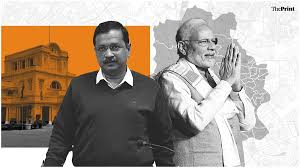Under overlords: On Centre-Delhi government relations
Supreme Court ruling on aldermen shows Delhi’s vulnerability to Centre’s dominance
The Supreme Court of India’s verdict holding that the Lieutenant Governor (L-G) of Delhi exercises independent authority while appointing aldermen to the Delhi Municipal Corporation, underscores the utter vulnerability of the elected Government of the National Capital Territory of Delhi to central overlordship. The judgment by a three-judge Bench rightly relies on the letter of the law governing Centre-Delhi government relations, as well as earlier judgments that sought to strike a balance between the elected regime and the appointed administrator. The final outcome of the latest round of litigation is not surprising, given that Delhi is a Union Territory, but it raises questions about the relevance of having an elected Assembly for Delhi. The Court held that the Lt. Governor’s power to appoint persons with special knowledge in municipal administration is his statutory duty, and is not one that he should exercise on the basis of advice from Delhi’s Council of Ministers. The power is an exception to the constitutional provision that says the L-G is bound by the aid and advice of Delhi’s Council of Ministers on all matters in the State and Concurrent Lists, except for the subjects of public order, police and land. The Court has rejected the Delhi government’s argument that municipal administration, being a State subject, the L-G could not have acted on his own.
Tracing the nature of the appointing power to the Delhi Municipal Corporation Act, 1957, as amended in 1993, a law enacted by Parliament, the Court noted that the Act identifies different authorities, each with distinct roles. While the Administrator was empowered to nominate 10 persons with special knowledge, the Speaker could nominate some legislators to serve on the Corporation by rotation. And that this showed that it was an independent statutory power. A Constitution Bench had sought in 2018 to lay down a framework to avoid escalation of issues arising from differences of opinion between the L-G and the Chief Minister. Such differences, as well as political acrimony between the ruling Bharatiya Janata Party at the Centre and the Aam Aadmi Party in Delhi, have been the principal driving force behind multiple conflicts and legal tussles over governing Delhi. However, in the ultimate analysis, it is the Centre that enjoys the final say. As the latest verdict on aldermen shows, the Constitution allows Parliament power to enact laws in respect of any matter on which the Delhi Assembly has jurisdiction, unlike other States which have an exclusive legislative domain. Parliament can also amend or supersede any law made by the Delhi Assembly. As legislative and executive powers are coextensive, this effectively means that the Delhi government can be undermined in any way the Centre wants.
